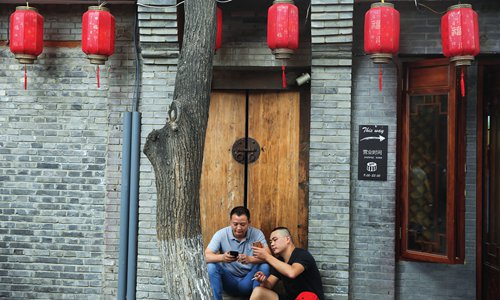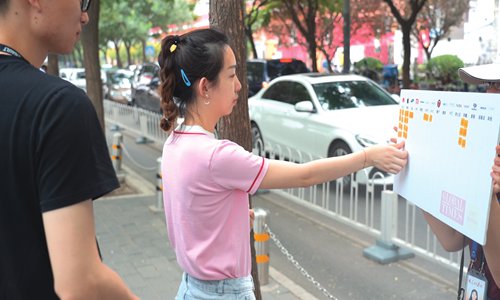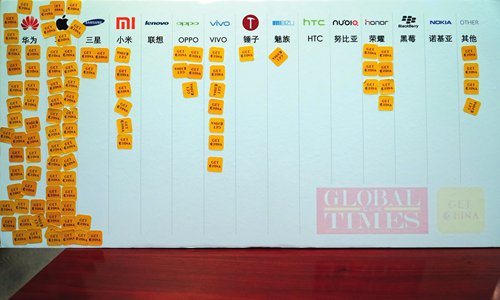HOME >> METRO BEIJING
Huawei or Apple?
By Huang Yiran Source:Global Times Published: 2019/7/23 17:53:40
GT surveys 100 Chinese on smartphone popularity

Two men sit in Beijing's hutong, staring at their cellphones. Photo: VCG
Without a doubt, smartphones have become a necessity for Chinese people today. When walking down the street, or taking public transportation, you may find that almost all the people around you are staring at a little screen in their hands, and most likely, you are one of them, too. How addicted are Chinese people to their cellphones? A recent survey by QuestMobile, a business intelligence services provider in China's mobile internet market, showed that nearly 1.1 billion Chinese people use smartphones for entertainment, and the average time they spend on smartphones is 4.7 hours per day.
According to the data of Counterpoint Research, China still has the largest smartphone market, but still carries over its sluggishness from 2018 into Q1 of 2019. Against the background of the trade friction between China and the US, as well as the upcoming 5G era, consumers' choices are full of uncertainties. What are the most popular smartphones among Chinese people? Why do they choose one brand over the others? The Global Times (GT) hit the streets in Beijing and interviewed 100 people to figure out these questions. To get a more complete range of answers, we did the street interviews at Nanluoguxiang - a hot tourist spot in Beijing; Sanlitun - an entertainment and business hub; and Hujialou - a residential area where more elderly people reside. The sample may not be large enough to support a scientific result, but it revealed some interesting facts about smartphone usage among Chinese in Beijing.

An interviewee puts a sticker on GT's survey board. Photo: Huang Yiran/GT

The result of the survey Photo: Huang Yiran/GT
Cost-effective and useful
Among the 100 interviewees, 39 people use Huawei (including Honor), 36 people choose Apple, seven people prefer Vivo, six use Xiaomi, five holds Oppo, three are fond of Samsung and six people use other brands. The result basically matches the data released by Counterpoint in June, showing that Huawei (including Honor) was firmly the market leader in China in Q1 of 2019, capturing 34 percent of the market share. Meanwhile, Apple's volume dropped to 9 percent due to its high-ticket price and impact from competitors. But Apple still has the highest sales revenue among all brands.
During the interview, GT found the age distribution of smartphone users to be quite interesting. It turned out that most Huawei users are older than 35 years old with a good steady job, while most young people, especially those who just entered universities or started working, prefer Apple.
"My family members all use Huawei, because it's more cost-effective," said a 48-year-old man, who is a teacher and earns 9,000 yuan ($1,307.5) per month. Three years ago he bought a Huawei Mate 8 at the price of 2,800 yuan. "It works well. The only problem is that the battery life is shorter."
A 35-year-old man from Taiwan island told GT he's a fan of Huawei. "I bought the new one because my old Huawei P9 became slow. My new Huawei is faster."
As for Apple users, the reasons for buying an iPhone vary from its design, system, performance and usage.
"I have been using iPhone for several years and got used to its operating system. So, I don't want to change," said a 27-year-old woman who works in art media. "It's just a matter of habit."
There are also people who have tried both the iOS and Android systems, and have gradually found their preferences.
"My first smartphone was an iPhone 4. I liked the design of iPhone during the 'Steve Job's era.' However, after he died, the design of the iPhone has changed a lot, and I don't want to use it anymore," a 26-year-old man said. Now he is using OnePlus, a Chinese smartphone brand that was founded in 2013 by former Oppo vice president Pete Lau and Carl Pei. He added that he likes the design of the brand.
"Chinese smartphone brands are improving their industrial design of their products. As a consumer, I'm happy to see we are provided with more options." he said.
Embracing 5G
As the world moves towards the era of 5G, Chinese carriers are at the forefront of the evolution mobile communications for the first time. According to a report by nbd.com on July 16, the first batch of 5G-enabled smartphones have obtained the China Compulsory Certification (3C), one of the final stages for the official launch of 5G. A source close to Huawei also confirmed with GT that the company is expected to release its first 5G smartphone, the Huawei Mate 20 X, on Friday at its headquarters in Shenzhen, South China's Guangdong Province.
For common people, the concept of 5G is still new and full of uncertainties. Many interviewees said that they know 5G smartphones are about to be released, but they don't consider buying one until they think the technology is mature enough. But there are also people who want to be the first to try something new.
"5G is definitely a trend. But for common people, 4G is fast enough and can satisfy my needs of working and watching videos," said a 36-year-old salesman who works in Sanlitun.
"I think 5G may make the smartphone more like an 'organ' in the human body, " said a 28-year-old man working in the car industry. "Its fast internet speed may enable people t0 do more things with a phone and bring more convenience to our lives."
"In the 5G era, people can directly feel the fast internet speed it provides. The peak of a personal user could reach 10G per second," said Zhang Chi, an expert in telecommunications and famous science author. "There are two other core characteristics of 5G, which are called the 'Internet of Everything' and 'Ultra-low Latency.'"
Zhang also pointed out that the construction of 5G is time-consuming. "We are only taking the first step into the 5G era."
Yu Jinsong contributed to this story.
Posted in: METRO BEIJING